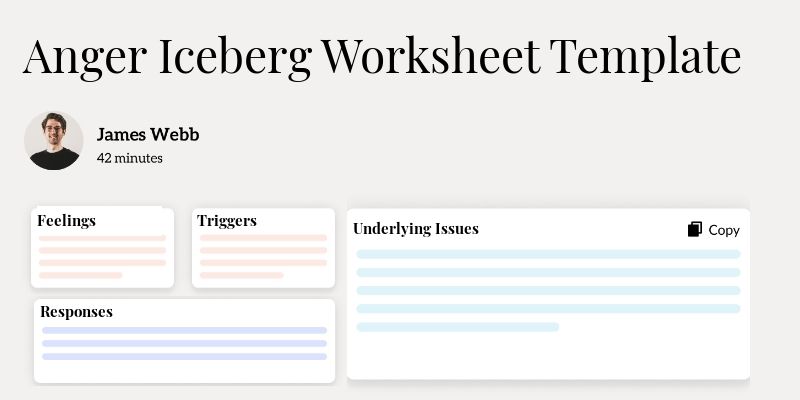
Anger Iceberg Worksheet Template
Exploring why emotions seem bigger than they are can seem challenging at times, especially when it comes to managing anger. The Anger Iceberg Worksheet Template is a tool many have discovered to be invaluable. It's said that recognizing the hidden feelings beneath our anger can lead to healthier emotional management. If you've ever felt out of touch with what lies beneath your outbursts, this could be the solution you've been looking for.
What Is an Anger Iceberg Worksheet Template?
The Anger Iceberg Worksheet Template is a therapeutic tool designed to help individuals identify and understand the range of emotions that underlie anger. Often, anger is what is visible on the surface, much like the tip of an iceberg, while other hidden emotions like hurt or fear lie beneath.
This tool is structured to facilitate self‑discovery and emotional intelligence by encouraging individuals to explore feelings they might not immediately recognize. By helping to pinpoint these deeper emotions, it supports better emotional regulation and interpersonal relationships.
Key Components of an Anger Iceberg Worksheet?
The worksheet is structured to guide users toward a broader understanding of their emotional landscape:
- Surface Anger: A section for noting immediate feelings of anger.
- Hidden Feelings: Spaces to explore and write other emotions such as fear, hurt, or frustration beneath the anger.
- Reflection Questions: Prompts to encourage deeper thought about what triggers these emotions.
- Coping Strategies: Suggestion areas for positive ways to manage these emotions.
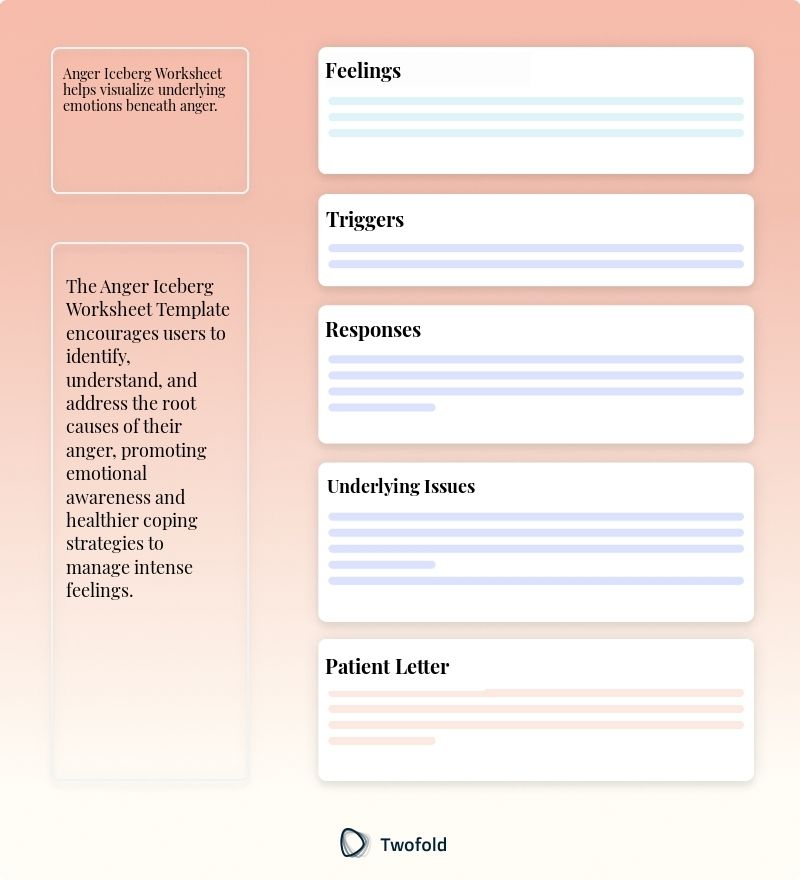
How to Use an Anger Iceberg Worksheet Template: Step-by-Step Process
Step 1: Identify the Anger
Start with noting the anger you're experiencing. Write down the situations or thoughts triggering this response.
Step 2: Explore Hidden Emotions
Beneath the noted anger, list other emotions such as frustration, sadness, or fear that you're also experiencing.
Step 3: Answer Reflection Questions
Engage with the guided questions to help uncover the roots of these emotions. This helps clarify why certain events trigger strong reactions.
Step 4: Develop Coping Strategies
Conclude with listing out healthy coping mechanisms. Consider activities like meditation or exercise to address underlying emotions.
Benefits of an Anger Iceberg Worksheet
Benefit | Description |
|---|---|
Emotional Awareness | Enhances understanding of underlying emotions, leading to better self-awareness. |
Improved Relationships | Fosters better communication and understanding with others by addressing hidden feelings. |
Personal Growth | Encourages ongoing personal development by regularly reassessing emotional responses. |
Stress Reduction | Provides tools for managing emotions, reducing overall stress and improving mental health. |
Stakeholders in Anger Iceberg Worksheets
The utilization of these worksheets extends across various stakeholders who find them to be highly beneficial in practice:
- Therapists: A therapist uses it to guide clients in uncovering the root of their anger during sessions.
- Educators: Teachers use it to help students identify emotional challenges, promoting classroom peace.
- Individuals: John found that completing the worksheets during quiet time significantly decreased his feelings of chronic anger.
Example of an Anger Iceberg Worksheet PDF
A digital PDF version of the Anger Iceberg Worksheet is available to ensure ease of access and usability, providing users with a printable resource to work with offline.
Real-World Use Cases: Practical Impact of the Anger Iceberg Worksheet Template
These worksheets have been pivotal in various real‑life scenarios, offering profound insight and transformation:
- After a significant disagreement, Sarah turned to the worksheet, discovering that her resentment towards a coworker was rooted in a fear of inadequacy, enhancing her professional interactions positively.
- In a school setting, adolescents engaged with the worksheets, leading to a notable decrease in classroom disruptions as they gained better control over sudden emotional outbursts.
- Within family therapy, parents and children used the worksheets together, which improved family dynamics by fostering mutual understanding and reducing confrontational interactions.
Conclusion
The Anger Iceberg Worksheet Template serves as an insightful tool for exploring the complexities of anger and the emotions beneath. By consistently employing this method, individuals can achieve greater emotional intelligence and healthier relationships. Its application across diverse contexts highlights its versatility and effectiveness in addressing complex emotional challenges.
Disclaimer: This article is for informational purposes only and does not constitute legal or medical advice. Always consult professional guidelines and regulatory bodies for specific compliance requirements.

Dr. Danni Steimberg
Dr. Danni Steimberg is a pediatrician at Schneider Children’s Medical Center with extensive experience in patient care, medical education, and healthcare innovation. He earned his MD from Semmelweis University and has worked at Kaplan Medical Center and Sheba Medical Center.
Anger is often the tip; the deeper feelings drive behavior. The DEEPS framework—Describe the trigger, Expose underlying Emotions, Evaluate evidence, Plan a coping Strategy—turns a simple iceberg diagram into a clinically powerful self‑audit.
- Describe & Expose: Start with the visible anger trigger, then list two hidden emotions beneath it (e.g., fear, shame). Naming layers demystifies the reaction and primes insight.
- Evaluate Evidence: For each hidden feeling, jot a quick fact that supports or disproves it (“I’m not actually in danger”). This cognitive check keeps the worksheet CBT-friendly and insurer-approved.
- Plan a Coping Strategy: End with one concrete action (deep-breathing, assertive statement) linked to the root emotion—turning awareness into behavior change you can track next session.
Frequently Asked Questions
Reduce burnout,
improve patient care.
Join thousands of clinicians already using AI to become more efficient.
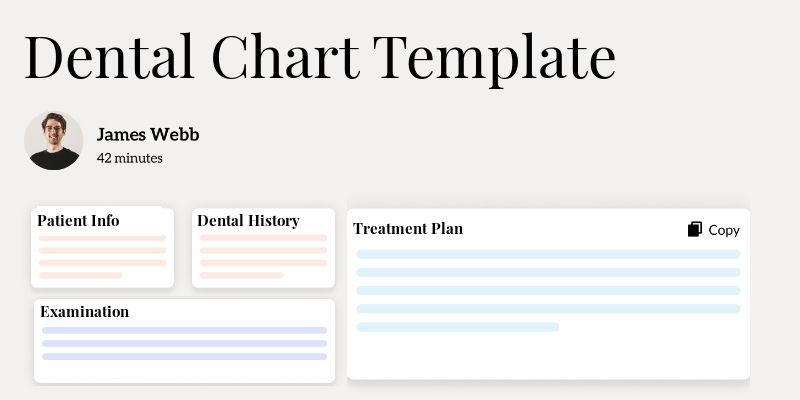
Dental Chart Template
Discover practical Dental Chart Template templates to enhance your documentation efficiency.
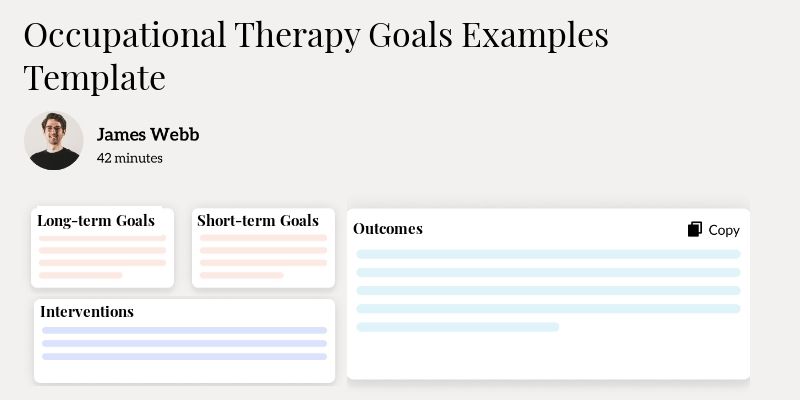
Occupational Therapy Goals Examples Template
Discover practical Occupational Therapy Goals Examples Template templates to enhance your documentation efficiency.
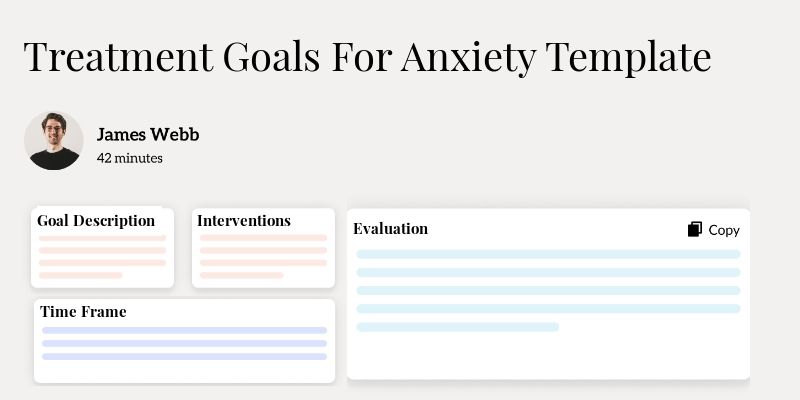
Treatment Goals For Anxiety Template
Discover practical Treatment Goals For Anxiety templates to enhance your documentation efficiency.

